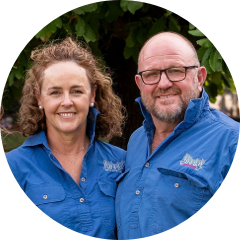Increasing plant diversity
This project was completed in 2021.
Project Officer
Jane McInnes
WHY THIS PROJECT WAS NEEDED
Cropping systems in Australia can have limited plant species diversity, with cropping sequences dominated by cereals and declining use of legumes. Increasing plant diversity can enhance species richness of soil biota by providing more diverse litter, root exudates and rooting patterns.
In short: This project assessed the impact of using a diverse range of summer and winter crop plant species on soil health and crop performance.
To help address a lack of species diversity in the region, Riverine Plains established a long-term (five-year) trial site at Burramine as part of a national Soil CRC project.
The trial examined the viability of integrating diverse species into the farming system, as either winter rotation crops (or green/brown manures), winter temporary intercrops (where multiple crops are sown but only one is taken to harvest) or as summer cover crops, within the constraints of soil water and weed pressures. The effect of each of these treatments on soil function and, ultimately, grain yields and farm profitability, were examined.
This project has been continued and refined through the Building soil resilience and carbon through plant diversity project.
Project focus
Riverine Plains established a fully replicated trial site at Burramine, in Victoria. Additional funding from Goulburn Broken CMA enabled additional trailing to look at the influence of alternative cropping practices on soil properties, including soil carbon, nutrient and water availability, and microbiology. This site connects with similar sites through QLD, NSW, SA and WA.
In this short video, project lead Professor Terry Rose, provides an update on the 2022 summer cover crops sown at the Burramine trial site, before the crops were terminated.
Project outcomes
Key messages from the 2021 trial were that:
- Cover crops produced < 1 t biomass in the 2020/21 summer.
- Cover crop water use did not significantly affect 2021 wheat yields, likely due to the relatively wet season.
- Growing vetch as a temporary intercrop with wheat did not significantly lower grain yield
- Few changes in soil functional properties were observed due to cover cropping, likely due to the small amounts of biomass produced each season.
- The 2021/2022 summer cover crop appeared larger than previous seasons due to the wet conditions, so any impacts on soil biology may be more detectable.

Vetch and wheat sown together.
Read more
- Results from the 2021 Increasing crop diversity trials were published in Research for the Riverine Plains, 2022
- Results from the 2020 Increasing crop diversity trials were published in Research for the Riverine Plains, 2021
- Results from the 2019 Increasing crop diversity trials were published in Research for the Riverine Plains, 2020
Find out more
For more information on this project, please email Riverine Plains Senior Project Manager, Jane McInnes at jane@riverineplains.org.au
Project investment
The project was supported by the Cooperative Research Centre for High Performance Soils (Soil CRC), whose activities are funded by the Australian Government’s Cooperative Research Centre Program.
The project was also supported by the Goulburn Broken Catchment Management Authority's ‘From the Ground Up’ program through funding from the Australian Government’s National Landcare Program.
Partners
MORE ON Soils & Grains
Our research enhances food production, increases environmental resilience and improves community connection across the Riverine Plains. See how our research creates impact.
-
Grains
Sustainability
-
Grains
Business
-
Grains
Sustainability
-
Grains
Livestock
-
Grains
Livestock
-
Soils
Sustainability
-
Soils
Sustainability
-
Grains
Sustainability
-
Grains
Business
-
Grains
Sustainability
-
Grains
-
Grains
-
Soils
Grains
-
Soils
Sustainability
-
Grains
Soils
-
Drought
Grains
-
Soils
Grains
-
Grains
-
Grains
Soils
-
Fodder
Grains
-
Grains
-
Soils
Sustainability
-
Grains
-
Soils
Sustainability
-
Grains
Soils
-
Sustainability
Grains
-
Grains
Sustainability
-
Soils
Grains
-
Soils
Climate
-
Grains
Sustainability
-
Soils
Climate
-
Livestock
Grains
-
Grains
Soils
-
Sustainability
Grains
JOIN RIVERINE PLAINS
Riverine Plains provides opportunities to see new research and innovation, connect with rural communities, and attend informative events.


